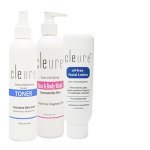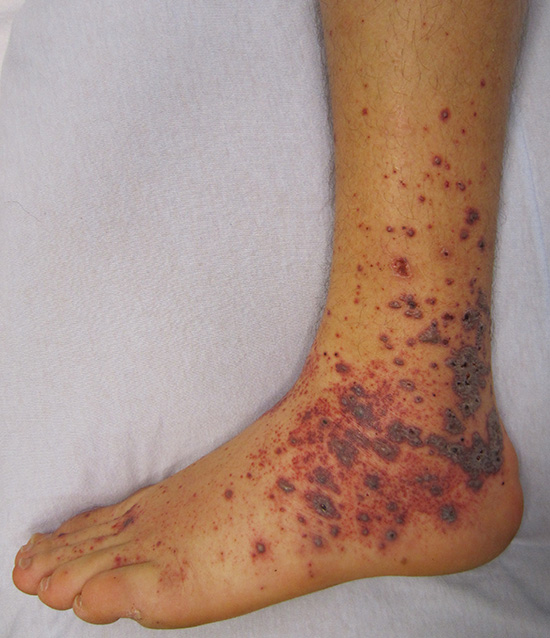Salicylate Free Diet
Managing Your Salicylate Intolerance WITHOUT Overwhelm
When is a salicylate free diet useful in dealing with allergies or skin problems? Do salicyates in food make my symptoms worse? Does salicylate intolerance mean that I can't eat ANY fruit? This guide will help you to simplify the process of reducing your exposure to salicylates in food and personal care products, so you can start feeling better soon!
Although it may feel overwhelming at first, dealing with a salicylate intolerance can actually help you to begin feeling better. Once you stop irritating your body and your sensitive skin, you will notice a BIG improvement!
When is a Salicylate Free Diet Helpful?
A salicylate free diet can be useful IF your doctor has diagnosed you with salicylate allergy or salicylate intolerance.
If you have chronic skin problems or other allergy symptoms, you may find that you experience fewer symptoms if you limit your exposure salicylates in your foods and personal care products.
Salicylates are found in many healthy foods, so please do NOT self diagnose yourself or eliminate ALL salicylates without first consulting with your health care practitioner.
Why a Salicylate Free Diet?
Salicylates in food are natural anti-inflammatory substances that in moderation are usually well tolerated by most people.
In today's modern world, our environment and food sources have become unbalanced. Our foods have a much higher salicylate content than even 100 years ago, due to modern farming practices.
In addition, our daily lives are now filled with salicylates in our medicines, toothpastes, shampoos, skin care products, and cosmetics.
It is no wonder that more and more people are developing saliyclate intolerance. This is a condition that is still new to medical professionals and is just now getting the attention it deserves.
A salicylate free diet is not necessary for most people, however if you have a salicylate allergy or salicylate intolerance, your doctor will prescribe a salicylate free diet at least until you can get your symptoms under control.
The symptoms of salicylate allergy are very similar to other food allergies so please do not try to diagnose yourself. You really need the assistance of a qualified medical or health care professional if you are planning to eat a salicylate free diet.
What Foods Can I Eat on a Salicylate Free Diet?
Generally raw foods and the skins and outer leaves of fruits and vegetables have higher salicylate contents. Depending on the severity of your salicylate intolerance, your diet may be very limited for a while until you get your symptoms under control.
MOST processed foods, artificial colorings, artificial flavorings and sauces contain a high salicylate content. Most people following a salicylate free diet choose to cook for themselves in order to have the healthiest and freshest foods.
Some foods with low salicylates such as soy or rice milk may have extra added ingredients which may have salicylates, so please read the labels on all foods.
Foods that are very low in salicylates include:
- Fresh meats
- Poultry
- Fish
- Eggs
- Dairy products except for blue vein cheese
- Tofu
- Soy Products (read the labels)
- Soy milk
- Rice Milk
Some vegetables which have very low salicylate content are:
- Bamboo Shoots
- Beans-dried
- Cabbage
- Celery
- Iceburg Lettuce (inside leaves)
- Lentils
- Peas
- Potato
- Swede
Fruits with very low salicylates include:
- Bananas
- Pears (peeled)
Grains which have low salicylates are:
- Barley
- Buckwheat
- Millet
- Oats
- Rice
- Rye
- Wheat
Sweeteners, oils and other foods with low salicylates are:
- Carob
- Cocoa
- Maple Syrup
- Butter
- Canola Oil
- Safflower Oil
- Soy Oil
- Sunflower Oil
- Vegetable Margarine
What Foods Should I Avoid on a Salicylate Free Diet?
Many commercial seasonings, herbs, spices, sauces, jellies and jams are very high in salicylates.
Dried fruits, berries, most fruits are high in salicylates to varying degrees.
The following fruits are have the highest salicylate content, and are generally avoided if you are eating a salicylate free diet:
- Apples
- Apricot
- Avocado
- Blackberry
- Black currant
- Blueberry
- Boysenberry
- Cantaloupe
- Cherries
- Cranberry
- Currants
- Dates
- Grapefruit
- Grapes
- Guava
- Kiwi fruit
- Loganberry
- Mandarin
- Melons
- Mulberry
- Nectarine
- Orange
- Peach
- Pineapple
- Plum
- Prunes
- Raisins
- Raspberry
- Redcurrant
- Strawberry
- Sultana
- Tangelo
- Tangerine
- Watermelon
- Youngberry
Vegetables with high salicylates include:
- Alfalfa sprouts
- Artichoke
- Broad bean
- Broccoli
- Canned green olives
- Canned black olive
- Capsicum
- Chicory
- Chili peppers
- Cucumber
- Eggplant
- Endive
- Fresh Spinach
- Gherkin
- Hot pepper
- Okra
- Peppers
- Radish
- Sweet Potato
- Tomato
- Tomato Products
- Water chestnut
- Watercress
- Zucchini
Nuts that are highest in salicylates include:
- Almond
- Brazil nuts
- Macadamia nuts
- Peanuts with skins
- Pine nuts
- Pistachio
- Water chestnut
Sweets that are highest in salicylates are:
- Chewing gum
- Fruit flavors
- Honey
- Honey flavors
- Jam (except for homemade pear jam)
- Licorice
- Mint flavored cady
- Peppermints
Seasonings that are highest in salicylates include:
- All Spice
- Aniseed
- Balsamic vinegar
- Basil
- Bay leaf
- Black pepper
- Caraway
- Cardamom
- Cayenne
- Celery powder
- Chili flakes and chili powder
- Cider Vinegar
- Cinnamon
- Cloves
- Commercial Gravies & Sauces
- Commercial Jam and Jelly
- Coriander
- Cumin
- Curry
- Dill
- Fenugreek
- Fish, meat, and tomato pastes
- Garam masala
- Ginger
- Honey
- Mace
- Mint
- Mixed herbs
- Mustard
- Nutmeg
- Oregano
- Paprika
- Peppermint
- Pimiento
- Rosemary
- Sage
- Tabasco
- Tarragon
- Thyme
- Turmeric
- Vegemite and nutritional or brewer's yeast
- White pepper
- White Vinegar
- Wine Vinegar
- sWorcester Sauce
Salicylates in Your Medicines and Personal Care Products
If you are eating a salicylate free diet, you can increase the beneficial effect of your diet by eliminating salicilate exposure through your personal care products.
Salicylates are contained in MOST personal care products that contain fragrance or perfume.
They are also in most shampoos, conditioners, shaving creams, sunscreens, skin care products, cosmetics, toothpastes, mouthwashes, and herbal remedies.
Salicylates are in aspirin, most pain reliever formulas, alka seltzer type medicines, muscle pain creams, and many herbal remedies.
I know, this is REALLY overwhelming isn't it!
The hardest thing about avoiding salicylates in your personal care products is that there are many ingredients which DO have salicylates but which are not called "salicylate" so you cannot tell from their name. A few examples of this are:
- Aspirin
- Acetylsalicylic acid
- Artificial coloring and flavoring
- Benzoates
- Beta-hydroxy acid
- Magnesium salicylate
- Menthol
- Mint
- Salicylic acid
- Salicin
- Peppermint
- Phenylethyl salicylate
- Sodium salicylate
- Spearmint
- White Willow Bark
Even more overwhelming, these ingredients sometimes go by OTHER names so it is very difficult to tell whether your personal care products contain salicylates.
Here are just a FEW of the many names that "aspirin" can be called in the name or the ingredients list of a product...
- 2-(Acetyloxy)-Benzoic Acid
- 2-Acetoxybenzenecarboxylic acid
- 2-acetoxybenzoic acid
- A.S.A.
- Ac 5230
- Acenterine
- Acesal
- Aceticyl
- Acetilsalicilico acetilum acidulatum
- Acetisal
- Acetonyl
- Acetophen
- Acetosal
- Acetosalic acid
- Acetosalin
- Acetoxybenzoic acid
- Acetylin
- Acetylsal
- Acetylsalcylate
- Acetylsalicylic acid
- Acidum acetylsalicylicum
- Acimetten
- Acisal
- Acylpyrin
- Alka-seltzer
- Anacin
- Asagran
- Asatard Ascoden-30
- Ascriptin
- Aspalon
- Aspergum
- Aspirdrops
- Aspro
- Asteric
- Bayer
- Benaspir
- Bialpirinia
- Bufferin
- Caprin
- Chlorpheninaurine; Claradin
- Csedrin
- Empirin
- Extren
- Gelprin
- Globoid
- Helicon
- Idragin
- Measurin
- Neuronika
- Norgesic
- Novid
- Nu-seals
- O-Carboxyphenyl Acetate
- Persistin
- PolopirynaRhodine
- Robaxisal
- Salacetin
- Salcetogen
- Saletin
- Salicylic acid acetate
- Solprin
- Solpyron
- Supac
- Triaminicin
- Vanquish
- XAXA O-acetylsalicylic acid
The good news is, you don't have to suffer and stop using cosmetics, shampoos, toothpastes, mouthwashes or skin care products. You can use salicylate free personal care products which are guaranteed to be 100% free of salicylates, and you will notice a really big difference in how you feel!
IMPORTANT NOTE: Most brands of salicylate free products STILL contain ingredients that can be potentially irritating or even allergy producing. You can learn more about this at our salicylate-free-products.html">salicylate free products page.
So far I've only found one company that provides safe salicylate free products that do not contain toxic ingredients. The only exception to this is their cosmetics line, some of which are older formulations that still contain parabens and other ingredients that I do not recommend.
As with any kind of product, please read the ingredients and do your own research on them. My free eBook Clear Any Skin Problem Naturally contains information on how to quickly and simply learn about the health effects of your product ingredients.
Home > Safe Cosmetics > Salicylate Free Diet









New! Comments
Share your thoughts about what you just read! Leave me a comment in the box below.